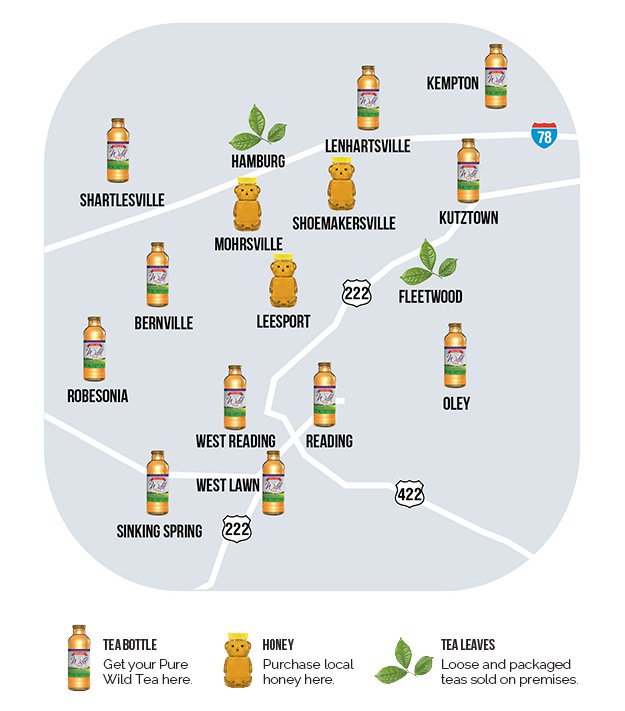Once upon a not-so-long-ago time, restaurants had two hot drinks on the menu: coffee and tea, the traditional black kind that stemmed from our Colonial beginnings under the British. But with health consciousness at the front of the nation’s zeitgeist, it’s completely commonplace to ask a waiter for their list of available herbal teas.
Many cafes and restaurants even offer a special menu of teas they infuse themselves. The cozy iCreate Café in Pottstown, for example, offers not only vegan Mediterranean dishes but also hot beverages made with flowers and exotic herbs with aromas so delicious, they feel like they’re healing you from the inside out — even before you’ve taken a sip.
Tea heals. Being scientifically minded, we have spent years proving in laboratories what our great-grandfathers and the Native Americans already knew: that teas of all sorts possess medicinal qualities. Black teas and green teas are high in antioxidants, disease-fighting compounds which keep illness at bay. Ginger tea quells nausea; lavender reduces nervous stress; thyme relieves congestion; and so forth. So now we’re working on backtracking, looking to the next obvious step backward into our historical relationship with herbs — which is really a step forward: we’re ensuring that what we put in our bodies is as pure as it can be, free of pesticides, additives and preservatives.
Pure and Wild
Which is probably why Sherry Fuhrmann’s homegrown tea company — Pure Wild Tea — is such a big hit. Of course, there’s another very big reason: these cold teas that come in bottles are delicious. Their rapid popularity, says this entrepreneur (who is a fourth grade teacher by day), is “so humbling.”
Her Apple Mint is made from a spearmint variety. “It has no apple flavor: somebody came up with the name because when you squeeze the leaves it smells like Granny Smith apples,” she says. “The Chocolate Mint is a peppermint variety. When you drink it, it reminds you of a Girl Scout cookie — with the peppermint up front and a chocolate breath or aftertaste.”
The Lemon Balm drink, like all her drinks, comes from Fuhrmann’s farm. “We grow close to 3 acres of lemon balm. As an herb, it’s good for memory, good for dementia and Alzheimer’s since it decreases agitation, at least [that’s] according to one study.”
New this year is Strawberry Mint.
Fuhrmann recalls, “When my husband and I went to the Healthy Tea and Beverage Expo in Long Beach, California — we were in the ‘Healthy Beverages’ category — some tea connoisseurs came up and said to us, ‘However did you create that layering?’ I had to laugh. It’s just a plant. God did that.”
She points out that her products accommodate purists who don’t want sugar added: “For all the teas I sell, there are ‘no sugar added’ teas. When I make tea with sugar, there are exactly 60 calories per 8 ounces. Bottles are 16 ounces, so 120 calories.” The effect is a very lightly sweetened drink.
Simple Origins
“I boil water and add my filtered mint (it goes through two filters) and steep it for a couple minutes, then it goes right into the bottles. There are only two ingredients in the Meadow Mint tea,” says Fuhrmann. “Strawberry Mint comes from a different variety of mint and reminds you of a wild strawberry in smell. Geist Nursery in Hamburg had some plants, which we used to propagate 3,000 plants on 1/5 of an acre! It’s very good in a lot of ways — high in vitamin C, and the mint whitens your teeth.”
“Another effect of mint tea is that it’s a natural diuretic — that’s one of the medicinal benefits. It’s good for colicky kids, too. Personally, I use it for energy. Studies show that mint creates blood flow, dilates blood vessels, and clears the mind for thinking. And it’s caffeine-free, so you get the feeling that you’re staying awake and the blood is flowing easier.”
Blue Mountain Herbals
Shirley Dierolf’s Blue Mountain Herbals shop in the heart of Hamburg is in its 29th year. On the shelves are 200 or so varieties of loose herbs, from an organic supplier, from rosemary to dandelion. “A lot of my bulk tea jars tell you how long to brew a tea — how long to steep it,” says Shirley. “These teas do come from all over. Years ago, I used to have access to a local peppermint tea, the kind the Dutch used to use for colds. It was called Blue Mountain tea.” In every likelihood, this mint is still being grown both wild and domestically.
The word “tea” is tricky: “People don’t realize that there’s an actual tea plant — the one like Tetley or Ceylon tea,” says Dierolf. “There’s white tea, green tea, black tea. But tea can be made from an herb, and we still refer to it as tea.” Peppermint tea in its purest form is not the same as black tea leaves that have been enhanced by peppermint oil for flavor. So people avoiding caffeine should always read the label or ask when ordering mint, peach, blackberry and others.”
What we call “herbal teas” can be made from plant flowers or bark, sticks, berries, fruits and combinations thereof. “Tisanes” or “herbal infusions” is more correct.
“Generally speaking, leaves don’t take as long to brew as roots and barks,” says Dierolf. “The denser it is, the longer it takes to brew.” For single cups, buy a tea infuser, which simply looks like a double teaspoon hinged together. You can pluck a teaspoon or so from loose herbs using this, then place it in a cup of just-simmering — not boiling — water. “I think you can get a better brew with it than a teabag because it’s usually fresher, and more surface area of the tea can expand into the water.”

Shopping and Sipping Locally
Farmers markets and farm stands not only offer varieties of black teas, green teas and herbal teas, but you can buy fresh herbs to make your own infusions — or even start your own herbal tea garden — by visiting any number of independent farm stands and farmer’s markets across the county.
Pure Wild Tea drinks by Sherry Fuhrmann are sold in numerous outlets, from Redner’s Quick Shops (10 locations) to Betty’s in Kutztown. Fuhrmann says, “Tell us what store you would like to see us in and if we get in, you get a free case of Pure Wild Tea!” purewildtea.com
Echo Hill Country Store in Fleetwood sources organic and medicinal teas. echohillcountrystore.com
Blue Mountain Herbals is chock-full of all sorts of teas and has a tea-knowledgeable owner. It’s a brick-and-mortar store located at 308 State St. in Hamburg. 610.562.4403.
Honey Hill Apiaries in Mohrsville has been in business 24 years. Look for its local honey in such stores as Grube’s Dairy in Shoemakersville, or ask your favorite stores to consider carrying their products. You’ll be supporting the local economy — and local bees.
Meadow View Beekeeping offers such luscious items as Ziegler’s Pure Alfalfa Honey (and other types, of course). It’s produced and packed by Keeney & Ziegler Apiaries in Bethel and available around the county, including at Leesport Farmers Market. Contact Steve Finke at 610.737.7676.
Additional resource: Penn State Master Gardeners of Berks County (on Facebook) for getting more deeply involved in herbs and locally grown teas.
Once upon a not-so-long-ago time, restaurants had two hot drinks on the menu: coffee and tea, the traditional black kind that stemmed from our Colonial beginnings under the British. But with health consciousness at the front of the nation’s zeitgeist, it’s completely commonplace to ask a waiter for their list of available herbal teas.
Many cafes and restaurants even offer a special menu of teas they infuse themselves. The cozy iCreate Café in Pottstown, for example, offers not only vegan Mediterranean dishes but also hot beverages made with flowers and exotic herbs with aromas so delicious, they feel like they’re healing you from the inside out — even before you’ve taken a sip.
Tea heals. Being scientifically minded, we have spent years proving in laboratories what our great-grandfathers and the Native Americans already knew: that teas of all sorts possess medicinal qualities. Black teas and green teas are high in antioxidants, disease-fighting compounds which keep illness at bay. Ginger tea quells nausea; lavender reduces nervous stress; thyme relieves congestion; and so forth. So now we’re working on backtracking, looking to the next obvious step backward into our historical relationship with herbs — which is really a step forward: we’re ensuring that what we put in our bodies is as pure as it can be, free of pesticides, additives and preservatives.
Pure and Wild
Which is probably why Sherry Fuhrmann’s homegrown tea company — Pure Wild Tea — is such a big hit. Of course, there’s another very big reason: these cold teas that come in bottles are delicious. Their rapid popularity, says this entrepreneur (who is a fourth grade teacher by day), is “so humbling.”
Her Apple Mint is made from a spearmint variety. “It has no apple flavor: somebody came up with the name because when you squeeze the leaves it smells like Granny Smith apples,” she says. “The Chocolate Mint is a peppermint variety. When you drink it, it reminds you of a Girl Scout cookie — with the peppermint up front and a chocolate breath or aftertaste.”
The Lemon Balm drink, like all her drinks, comes from Fuhrmann’s farm. “We grow close to 3 acres of lemon balm. As an herb, it’s good for memory, good for dementia and Alzheimer’s since it decreases agitation, at least [that’s] according to one study.”
New this year is Strawberry Mint.
Fuhrmann recalls, “When my husband and I went to the Healthy Tea and Beverage Expo in Long Beach, California — we were in the ‘Healthy Beverages’ category — some tea connoisseurs came up and said to us, ‘However did you create that layering?’ I had to laugh. It’s just a plant. God did that.”
She points out that her products accommodate purists who don’t want sugar added: “For all the teas I sell, there are ‘no sugar added’ teas. When I make tea with sugar, there are exactly 60 calories per 8 ounces. Bottles are 16 ounces, so 120 calories.” The effect is a very lightly sweetened drink.
Simple Origins
“I boil water and add my filtered mint (it goes through two filters) and steep it for a couple minutes, then it goes right into the bottles. There are only two ingredients in the Meadow Mint tea,” says Fuhrmann. “Strawberry Mint comes from a different variety of mint and reminds you of a wild strawberry in smell. Geist Nursery in Hamburg had some plants, which we used to propagate 3,000 plants on 1/5 of an acre! It’s very good in a lot of ways — high in vitamin C, and the mint whitens your teeth.”
“Another effect of mint tea is that it’s a natural diuretic — that’s one of the medicinal benefits. It’s good for colicky kids, too. Personally, I use it for energy. Studies show that mint creates blood flow, dilates blood vessels, and clears the mind for thinking. And it’s caffeine-free, so you get the feeling that you’re staying awake and the blood is flowing easier.”
Blue Mountain Herbals
Shirley Dierolf’s Blue Mountain Herbals shop in the heart of Hamburg is in its 29th year. On the shelves are 200 or so varieties of loose herbs, from an organic supplier, from rosemary to dandelion. “A lot of my bulk tea jars tell you how long to brew a tea — how long to steep it,” says Shirley. “These teas do come from all over. Years ago, I used to have access to a local peppermint tea, the kind the Dutch used to use for colds. It was called Blue Mountain tea.” In every likelihood, this mint is still being grown both wild and domestically.
The word “tea” is tricky: “People don’t realize that there’s an actual tea plant — the one like Tetley or Ceylon tea,” says Dierolf. “There’s white tea, green tea, black tea. But tea can be made from an herb, and we still refer to it as tea.” Peppermint tea in its purest form is not the same as black tea leaves that have been enhanced by peppermint oil for flavor. So people avoiding caffeine should always read the label or ask when ordering mint, peach, blackberry and others.”
What we call “herbal teas” can be made from plant flowers or bark, sticks, berries, fruits and combinations thereof. “Tisanes” or “herbal infusions” is more correct.
“Generally speaking, leaves don’t take as long to brew as roots and barks,” says Dierolf. “The denser it is, the longer it takes to brew.” For single cups, buy a tea infuser, which simply looks like a double teaspoon hinged together. You can pluck a teaspoon or so from loose herbs using this, then place it in a cup of just-simmering — not boiling — water. “I think you can get a better brew with it than a teabag because it’s usually fresher, and more surface area of the tea can expand into the water.”

Shopping and Sipping Locally
Farmers markets and farm stands not only offer varieties of black teas, green teas and herbal teas, but you can buy fresh herbs to make your own infusions — or even start your own herbal tea garden — by visiting any number of independent farm stands and farmer’s markets across the county.
Pure Wild Tea drinks by Sherry Fuhrmann are sold in numerous outlets, from Redner’s Quick Shops (10 locations) to Betty’s in Kutztown. Fuhrmann says, “Tell us what store you would like to see us in and if we get in, you get a free case of Pure Wild Tea!” purewildtea.com
Echo Hill Country Store in Fleetwood sources organic and medicinal teas. echohillcountrystore.com
Blue Mountain Herbals is chock-full of all sorts of teas and has a tea-knowledgeable owner. It’s a brick-and-mortar store located at 308 State St. in Hamburg. 610.562.4403.
Honey Hill Apiaries in Mohrsville has been in business 24 years. Look for its local honey in such stores as Grube’s Dairy in Shoemakersville, or ask your favorite stores to consider carrying their products. You’ll be supporting the local economy — and local bees.
Meadow View Beekeeping offers such luscious items as Ziegler’s Pure Alfalfa Honey (and other types, of course). It’s produced and packed by Keeney & Ziegler Apiaries in Bethel and available around the county, including at Leesport Farmers Market. Contact Steve Finke at 610.737.7676.
Additional resource: Penn State Master Gardeners of Berks County (on Facebook) for getting more deeply involved in herbs and locally grown teas.
















